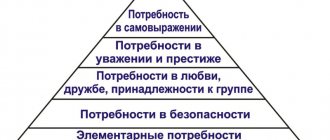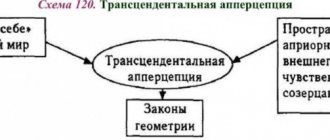Psychological structure of need
The structure of needs has two main components:
- The substantive content of a need is the totality of those objects of the external or internal environment with the help of which a given need can be satisfied. However, the substantive content of needs is generalized.
- Tension that arises in the presence of an urgent need, expressed in a feeling of psychological discomfort - tension, anxiety, a feeling of dissatisfaction caused by a shortage of what is required. A person’s natural desire to get rid of this psychological discomfort becomes a source of active behavior and activity. Thus, need activates the body, stimulates its behavior aimed at finding what is required.
Functions
There are three stages that determine a person's needs. First, a need is formed when a person has a certain attitude, feelings and emotions towards external stimuli. Then motivation is built, and the third stage is awareness of the need. At the same time, a person experiences negative or positive emotions, specific thoughts, goals and plans appear.
There are two main functions:
- Signal. When a need arises, a person feels a shortage, thoughts change, and the state becomes more restless until the need is satisfied.
- A driving need. The individual begins to act in his own interests. Activity and work activity manifest themselves, and a person’s behavior changes radically.
In fact, the classification of human needs closely intersects with functions. However, only a few species have been described. Many psychologists count more than 130 human needs. This is a lot, but people still strive to live better and satisfy their needs with both material and spiritual benefits. The same can be said about the needs of society.
Types of needs
There are several different classifications of human needs. The most famous and widely used is A. Maslow’s classification into hierarchically constructed groups, the sequence of which indicates the order in which needs arise in the process of individual development, as well as the development of the motivational sphere in general. In a person, according to his concept, the following seven classes of needs sequentially appear from birth and accompany personal maturation:
- Physiological (organic) needs;
- Security needs;
- Needs for belonging and love;
- Needs of respect (honor);
- Cognitive needs;
- Aesthetic needs;
- Self-actualization needs.
The listed groups of needs, according to Maslow’s concept, are at the same time “the main levels of needs, located in the form of a strict hierarchical structure of subordination, where the first group forms the base, and the fifth – the top of the hierarchy. This means that the needs of each higher level arise (are actualized) only when the needs of all lower levels are satisfied.
One of the most common in Russian psychology is the classification of human needs by source of origin . According to this classification, needs are divided into:
- Primary (biological: natural, basic, innate) needs - needs for food, water, temperature comfort, sleep, sexual needs. Satisfaction of these needs ensures individual and species existence; these needs are common to animals and humans. However, biological needs are transformed under the influence of life in society, they manifest themselves and develop differently than in animals.
- Secondary (social: cultural, acquired) needs - needs for belonging to a group, recognition, respect and love, self-affirmation, i.e. needs directly related to a person’s life in society and his interaction with other people.
- Some authors add to the listed two types of needs a group of spiritual needs , which include the needs for knowledge of the world, self-esteem and self-realization, and aesthetic needs. Just like social, spiritual needs arise and develop during the development of human society and the socialization of the individual, however, unlike social needs, spiritual needs are connected with human social life only indirectly.
A special group of needs also consists of pathological needs - needs acquired as a result of the use of substances that cause a state of euphoria. Pathological needs are the main symptom of diseases such as alcoholism and drug addiction.
If any of the actual needs of the individual cannot be satisfied for objective or subjective reasons, then a state of frustration arises in the person, in which the tension of the need persists and causes discomfort, and the substantive content of the need is inaccessible. In this case, as a rule, the psychological defense of the individual is activated, aimed at eliminating the discomfort caused by the tension of the need. There are many different psychological defense mechanisms, but each person may have one or more mechanisms that he regularly uses. The most frequently used mechanisms of psychological defense of an individual can act as one of the characteristics of its orientation.
The essence of the concept
Every person needs something. Everything depends on the living conditions, the individual’s activities, material objects, etc. This is the individual’s need. That is, this is the internal state of a person, because of which something is felt to be insufficient. The need manifests itself differently for everyone, depending on certain situations. Experts have noticed that the need never ends. If a person has satisfied one need, another immediately appears. This cycle happens throughout life. Each need is manifested by certain emotions. A person becomes angry and irritable when he cannot satisfy a need, that is, negatively disposed. Positive emotions only appear when everything has worked out.
If needs are not met, discomfort appears, which gradually develops into a negative state. That is why people try to create all the conditions for a comfortable and prosperous life. Every living organism needs something. This is not necessarily a person, but also plants, animals, insects and other living creatures. The concept and classification of needs are considered in diverse aspects. However, psychologists associate them with human needs in different areas and directions. This is the essence of every need.
The importance of needs in human life
Needs have a great influence on the development of personality and the characteristics of human activity. Needs underlie all types of human activity, including his activities. Therefore, needs and motives influence the effectiveness of human activity. The effectiveness of activities is influenced by the following main factors related to human needs:
- Strength of need: the quality of activity is best with average strength of need and deteriorates with too weak or too strong motivation.
- The content of the needs underlying the activity: if the activity directly satisfies the need underlying it, then the effectiveness of the activity increases. For example, if the professional activity of a medical worker is based on the desire to help other people, then his activity will be more effective than if his activity is based on material needs.
In the process of carrying out activities, a person’s personality develops. Therefore, the level of psychological development of a person as an individual is determined by the number, variety and hierarchy (subordination) of a person’s needs. Man differs from animals in that he has more needs than animals, and these needs are much more diverse. Animals have only organic needs and some needs related to ensuring the physical safety of the body, while humans also have material, social, creative, spiritual needs, as well as mental development needs. Each of these groups of needs can, in turn, be represented by many private needs included in the corresponding group. Thus, the number and degree of differentiation of needs that a person has can serve as a characteristic of the level of his psychological development.
An even more important characteristic of a person’s level of development is the diversity of his needs. But even more than the total number and variety of existing needs, a person as a person is characterized by which of his needs are primary and which are secondary. If, among the many needs he has, a person primarily pays attention to satisfying his organic needs, then we are unlikely to be dealing with a psychologically highly developed personality. But if a person’s creative or spiritual needs come first in importance, then he really is a highly developed personality.
Why do social groups arise?
Throughout his life, a person is a member of many social groups. He ends up in some involuntarily (family, school class, production team), while in others he enters consciously. Why? If his personal needs and interests coincide with those of other people, then this brings him closer to them, and mutual interest in communication and pastime is formed. Individual needs become the needs of a social group:
- the need for collective communication and informal contacts;
- in cooperation for the benefit of society;
- in mutual understanding, support, assistance, recognition;
- in organizing collective leisure;
- in the exchange of life and professional experience;
- in self-affirmation and self-realization of each individual, in public recognition of the significance of the activities of the entire group.
In friendly groups, not only business, but also emotional attachments and a sense of security are sure to develop. Common goals and objectives stimulate a creative search for methods to solve them.
What does an unfulfilled need lead to?
Not every person manages to satisfy their needs the way they want. Therefore, there are situations when the need remains unfulfilled. What happens in this case? If a person has not been able to satisfy his need for self-realization, he becomes insecure and complex. In the future, such people do not have common topics of conversation with others. If a person has not satisfied the need for security and does not have stability, then psychological trauma appears. Subsequently, fear, nervousness, and stress appear.
When a person does not have friends and loved ones on whom he can rely, it means that the need for love is unsatisfied. Such people become withdrawn and lonely. They quickly fade and life becomes boring and uninteresting for them.
As it turned out, the physiological need is the most important. If it is not realized, then the person begins not only to get sick, but also to “fade away” before our eyes. The consequence can be disastrous. Any unfulfilled need negatively affects both health and the human psyche. This is why psychologists believe that it is necessary to satisfy your needs as soon as they arise.
Individual and community needs
Society consists of individuals who have their own biological characteristics - health status, characteristics of physiological processes in the body, differences in the structure and functioning of the nervous system, which determine the natural inclinations of a person. Based on natural inclinations, the abilities that a person realizes in his life are formed. The formation of a person’s needs is influenced by both his natural individual traits and the influence of the social environment.
In different eras, society had a need to use various natural inclinations and abilities of people. Thus, under the conditions of a caste system, abilities not related to the occupation prescribed for a given caste seemed unnecessary. For example, a person born in the merchant caste had the right to engage only in trade, in the laundry caste - only in laundry, etc.
One of the main trends in the development of relations between man and society is the individualization of the individual. Economic development and increasingly complex production processes required increasingly qualified, competent and independent workers. Currently, this leads to the gradual formation of an individual style of production activity and an individual style of consumption interconnected with it. .
The mechanism of interaction between the individual and society is modified and rebuilt. This is reflected in the relationship between individual and social needs.
In human societies there have always been differences between the needs of individuals, groups of people and society as a whole. As already noted, special mechanisms have been developed to regulate relations between society and the individual—primarily morality and law. However, it is now necessary to clarify the nature of these relationships: what are the specific differences between individual and social needs and what unites them?
The mechanism of the relationship between individual and social needs is reflected in the following patterns.
1. In the simplest case, social needs are simply the sum of individual needs. They can be easily quantified by simple addition. So, if one family needs one apartment, then a thousand apartments will be required to accommodate a thousand families. If, for example, it turns out that one person uses the services of a hairdresser on average once every two months, then it is easy to calculate how many people will come to hairdressers in a city with a million population. Urban planning standards are based on this simple relationship, allowing one to assess the need of an individual city for shops, hospitals, schools, consumer services, etc.
2. In more complex cases, social needs go beyond individual needs and are not reduced to their sum. This pattern was understood by the creators of the contract theory of the state. Thomas Hobbes believed that the state is necessary for citizens, since it satisfies the needs that exist among the people as a whole - in managing society, defense, maintaining public order, etc. A number of services are generally of a purely social nature and cannot be individualized, aimed only at one individual person. These are the activities of the media, public organizations, education and healthcare systems, public transport, the army and law enforcement agencies. All of them satisfy social needs. Thus, society as a whole, groups and associations of people acquire needs of a special kind, which cannot be completely, without remainder, decomposed into individual needs. At the same time, by satisfying social needs, we also satisfy the individual needs of people included in a given social community. There is no “man in general” who is the monopoly bearer of social needs.
The difference between social and individual needs is manifested in the difference in the mechanisms of their awareness. Society or social groups are aware of their needs longer and more complexly than individuals. Often a social need is first recognized by a small group of people or a government agency that draws public attention to it and makes efforts to achieve its widespread awareness and satisfaction. In our time, we are in a state of gradual awareness of the need to solve the environmental problems of civilization or in space exploration; in Russia there are a number of acute social problems (the need for society to care for homeless children, regulate migration processes, etc.).
It seems to us that the same needs can have different meanings for society as a whole, for different groups of people and for an individual. Thus, the need for procreation and raising children is urgent for society as a whole - it is clear that without its satisfaction it will cease to exist. At the same time, for an individual person this need is not considered urgent - even complete renunciation of family and sexual relationships is quite compatible with life and is a mandatory requirement for monks of various church denominations. The need for work is also urgent for society, but there have always been individuals who were not involved in work and probably did not feel the need for it. Such differences in the significance of the same need for society and for the individual are associated, in particular, with the fact that individual individuals perform different functions in the social system.
3. Finally, social needs are considered as the needs of the majority of individuals. In this sense, the needs of people who are not part of this majority are antisocial. Thus, we can say that the system of values expressed in the commandments of the Old Testament and the needs corresponding to it is social. To counteract people who impede their satisfaction (committing, as they say, “antisocial” acts), mechanisms of moral and legal coercion arose.
Complex processes of interaction between personal, group and social needs change and evolve throughout history. Thus, anti-democratic regimes that place a low value on the human person usually neglect their individual needs. The needs of only elite groups of the population are met here at a high level. In more democratic societies, numerous firms and organizations arise that specialize in providing services to the general public, since promoting better satisfaction of the needs of the bulk of citizens is an important priority of government policy.
Individual human needs
An individual is a single person, a representative of the human race, with unique psychophysical characteristics. An individual, in fact, has both individual biological and social needs.
Individual biological needs primarily include the needs for food, clothing and protection of life and health. Each person, depending on his gender, age, mental and physical activity, national traditions, habits, body weight and size, health status and tastes, requires his own individual nutritional standards in terms of calories, content of nutrients and vitamins, taste and individual requirements for clothing according to its sizes, models and other consumer properties.
Complete and high-quality satisfaction of individual needs for food and clothing pursues the main goal - satisfying the main need of the individual - protecting his life and health.
Satisfaction of this main physiological need, in addition to food and clothing of the individual, directly depends on his healthy lifestyle, which presupposes a high sanitary and hygienic culture for everyone, abstinence from the consumption of tobacco, alcohol and drugs.
In our country, 70% of the population does not engage in physical education, and the prevalence of physical inactivity (reduced mobility of a person due to a decrease in the strength of his movements) among schoolchildren has reached 80%, more than 30% of the population are underweight and the same amount is overweight, as a result of improper and irrational nutrition.
The problem of smoking is becoming increasingly acute in the country. In recent years, the proportion of men under 40 who smoke has increased from 1/2 to 7/10. The number of teenagers smoking is rapidly increasing. Today, every tenth schoolchild is dependent on tobacco and has some signs of smoking-related diseases.
Drunkenness remains an acute problem in the country. The overall morbidity rate for people who abuse alcohol is 2 times higher than for people who do not drink alcohol. Alcohol abuse is the cause of more than 7/10 of all accidents. The number of people using drugs has increased significantly. Their average age is constantly decreasing. Currently, more than 3 million people use drugs, almost two thirds of them are young people under the age of 30, who make up the main group of HIV-infected people.
Individual social needs of a person include his spiritual, ethical and aesthetic needs, the need for self-expression and self-affirmation, and protection from criminal attacks on his life and property. Knowledge and mastery of universal human values of peace, friendship, goodness, justice and mutual assistance; possessing a sense of beauty and love for family and friends, for the small and large Motherland; high aspirations for selfless service to one’s people and all of humanity - all these are the natural needs of a spiritualized person.
To fulfill this great mission, the comprehensive and harmonious development of the individual, his healthy lifestyle, which presupposes an organic combination of high morality and sanitary and hygienic culture, are necessary. Human biological and social needs are interconnected, complement and enrich each other.
The need for work is both a biological and a social need of a person. Strong and exciting work strengthens a person’s health, prolongs his life, making it interesting, meaningful, elevating and confirming the working personality. Therefore, a growing person from his childhood is invisibly faced with the task of knowing himself, his abilities, developing them and using them effectively in his present and future life.
Human family needs
The family is the primary and basic biosocial unit of human society, which is a group of people united by love, marriage and blood ties.
A family is characterized by three main features: cohabitation of its members, the presence of their relationship and joint management of the household, and a common budget. Important functions of the family: love, giving birth and raising children, mutual assistance in life and everyday life, spiritual communication and unity. All these functions determine the interrelated physiological and social needs of the family.
The first and most important biological need of a person is the need to reproduce the human race, to give birth and raise children, which is also a social need of people, because by giving birth and raising children, a person achieves self-expression and self-affirmation among his close contemporaries and relatives. A son or daughter, each of them is the successor of the parents' line, the heir to the family values of their ancestors.
The family is based on peace, mutual understanding, friendship, harmony, respect for elders and the best national and family traditions. Spirituality and morality that reign in the family are given first place. As sociological studies have shown, the second place is firmly occupied by the family's financial wealth and its living conditions, which determines the possibilities and desires of parents to have a second child. At the birth of their first child, for most parents such conditions are not the main and determining ones.
Maximum satisfaction of all the needs of families and an increase in their material well-being contribute to an increase in the birth rate and growth in the total number of people, which is the main indicator of human development. In strengthening family ties and increasing the birth rate, great, and in some cases decisive, importance is given to the economic activities of family members, their households and the entire economy as a management system.
Social needs of people
The appearance of a person determines his social essence. The first social need of a person is his communication with people like him. All non-family communication between people and all their social needs, by nature and scope, can be divided into four levels:
1) team (groups of neighboring and friendly families, employees at work, students, colleagues in amateur and other activities);
2) region (residents of villages, districts, cities, regions and other administrative-territorial and natural-geographical areas);
3) country (citizens and the entire population of the state);
4) humanity (world community of people).
After family, the closest and most necessary communication for people occurs in a team in the process of joint work, joint arrangement of everyday life, other joint activities and recreation. Therefore, when asked what happiness is, people often say - it’s when you go to work from home with joy and return home with the same joy. Companionship and healthy friendly relations between employees and a favorable psychological climate in the work team have a great positive impact not only on the psychophysical state of people, but also, as a consequence, on the results of their work. Conversely, the absence of such relationships and such a climate leads to mental disorders, nervous and other diseases. It’s not without reason that they say that if you’re in a bad mood, everything will fall out of your hands.
At the regional level, the main social needs of people are education, cultural performances, amateur and social activities, and biological needs consist of organizing public catering, the need to treat diseases, and physical education and sports. Satisfaction of these needs is carried out through the creation and operation of schools, universities, libraries, cultural centers, theaters, hospitals, clinics, sports facilities and much more, which require large monetary and material resources obtained as a result of the economic activities of people and the work of enterprises producing the corresponding material goods.
At the country level, legislative support is provided for the biosocial, individual, family and collective needs of people. The problem of legal regulation and state guarantees for the implementation of these needs is being solved. For this purpose, state bodies governing various areas of material production and culture, education, health care, social protection, law enforcement and other bodies are created and function. And all of them are supported by taxes and fees from income from the economic activities of people and the work of enterprises. Consequently, at this level, the satisfaction of people’s social needs depends on the economy, on material resources and money.
The highest level of people's social needs is their communication at the interstate level. The need for this communication and interaction between people of different countries is growing due to the increasing need for a joint fight against international terrorism and the transformation of local wars into global wars, pollution of the natural environment and the predatory use of natural resources.
Chapter 6. Formation of needs
1. Formation of needs in the conditions of scientific and technological progress
Technology, according to Marx’s definition, is “the materialized power of knowledge.”93 From this definition it follows that immaterial knowledge, as well as the organs of the human body (legs, arms, head, etc.) are inalienable human powers, and, therefore, the technology does not have certainty.
The human mind, using natural materials, transforms them into tools of labor, into means of transport, into weapons for defense and wars of conquest, into medical instruments, into means of sports and entertainment. The history of human society and social progress is clearly visible in the progress of technology - from the stone ax to the modern computer and spaceships. They are the objective embodiment of technical progress.
Technology is, first of all, a means of human activity. As such, it is used to achieve the goals that individuals, groups of people, nations or states set for themselves, therefore, technology is not created for the sake of technology, it has always been, is and will be a means to achieve any goal. Without functioning as a means, technology ceases to be itself, turns into scrap metal, into garbage.
In the history of society, technology has played the role of a two-faced Janus. Depending on whose hands it is in, it can serve both to multiply good and spread evil: deepening the environmental crisis, strengthening the power of anti-people regimes, spreading diseases. Technology frees people from exhausting physical labor and, at the same time, creates unemployment; it represents high-speed means of transport and, at the same time, is fraught with increasingly disastrous transport disasters (for example, the disaster in the spring of 1998 of a passenger train in Germany, moving at a speed of 200 km per hour, in which about 200 people died and the consequence of which was the decision of the German government to limit the speed of trains to 100 km per hour). Technology promotes the assimilation of new areas of natural resources, but it also brings closer the hour of environmental catastrophe. The list of contradictory, mutually exclusive consequences of technological progress can be continued. They all emphasize the idea that technology can serve both humane and inhumane purposes. The mentioned two-facedness of technology gives rise to an ambiguous attitude towards technical progress throughout history.
Even in ancient civilization, there was an ambivalent attitude towards technology.
If Herodotus describes with joy and admiration such amazing creations of technical art as the Isthmus of Athos, the bridge over the Gellospont, the aqueduct on Samos, if Aeschylus in his “Prometheus” explains the fundamental human mission of technology, then Sophocles already gives reasonable proof of the dangerous nature of technology in the famous chorale from "Antigone". He talks about the terribleness of man, which led him to technology, about the monstrous destructive power that technology gave to man. Since man, with the invention of technology, has received an unexpected intellectual tool into his hands, he is at the crossroads between good and evil.94
Many ancient thinkers, for example Plato and Socrates, placed a contemplative moral and aesthetic attitude towards nature above practical technical thinking. They considered the inventors of tools to be individuals of low intelligence. Technicalism as a synonym for pragmatism did not dominate the minds of the ancient Greeks.
The authors of technical inventions themselves (for example, Archimedes) considered it necessary to explain that they were engaged in research not for practical needs, but for the sake of entertainment. And the mythological Prometheus - a symbol of the transformation of the world - was not a human being and, because of this, transferred technical creativity to the realm of divine gifts that man simply “finds.”
The modern era is full of pessimistic predictions about the consequences of scientific and technological progress. Thus, the XV World Congress of Philosophy (1973), dedicated to the problem of “man and technology,” expressed the polarity of philosophers’ views on this topic. Western philosophers, representing countries with advanced technologies, were critical of technology, noted its dehumanizing influence on people, and called Marx a technocrat for his statements about the leading role of technology in the structure of the productive forces.
The English sociologist Kliter predicted a future when computers and robots will displace humans from all spheres of life and will dance the cancan on the grave of the last person, reproaching him for how stupid he was by creating thinking machines.
On the other hand, philosophers from India, Pakistan, and Afghanistan saw the cause of all the disasters of the peoples of their countries in the insufficient development of technology.
A broader concept of technology compared to technology. It is determined on the basis of a systems approach and helps to clarify the place of man in the direct production process.
Technology is a production process, considered from the point of view of the active implementation of a target setting with the optimal use of labor tools (technical and human), scientific achievements, production management methods and product quality control.
Humanization of technological processes means nothing more than the transfer of a model of the functioning of the human body and human activity to technology. Another pole of the interaction between man and technology in technology is the technization of man, i.e. the transformation of human organs and acts of his activity, his intellectual potential into one of the means (factors), into an instrument for achieving a technical goal. This is undoubtedly a dehumanizing sign of technology, since it sharply reduces the possibilities of a person’s self-realization, his spiritual and moral qualities, that is, everything that fits the capacious definition of personality.
By creating material values for society, a person depreciates, turning into a simple function of a technological process.
There are two ways to eliminate the dehumanizing feature of the technological process mentioned here. The first, compensating method. It consists of compensating for technical alienation in the production process with a good salary and creating conditions for the comprehensive development of the individual outside of production. Man moves from a position of being in himself to a position of being for himself.
The second method is to humanize the technological process, to create such conditions in production so that in the technological process a person can realize his personal and civic qualities. This second method is more difficult, and it should be the subject of close attention to technical education and its humanization.
Let's try to formulate some philosophical approaches to solving this problem.
In various forms of human activity, different types of thinking, different levels of the human mind, inherent in these types of activity, predominate. Main levels: analytical mind, synthetic mind, dialectical mind.
“Technology is the culmination of the analytical mind, and computers are the highest example of the analytical mind in action. And the greater the progress of computer technology, the greater the danger of turning the analytical mind into the only way of thinking and technologizing the entire human mind” (D. George. USA).
The training of engineering personnel is based on the priority development of analytical thinking. This is an axiom of technical education. The danger of dehumanizing the engineer, of training an inhuman engineer, does not lie in denying this axiom. Dehumanization begins where the analytical mind is seen not only as prevalent, but also as the only way of thinking of a future specialist. When the analytical mind is not limited to the sphere of technology, but expands to all other spheres of human life: culture, spiritual and moral life of society.
To avoid this, from the first days of a student’s stay at a university, it is necessary to focus on overcoming a one-sided view of their future technical specialty. It is necessary for the future technical specialist to focus on mastering a whole complex of humanitarian knowledge, so that he develops himself, first of all, as a person, and then as an engineer. This is exactly how many technological universities in Western countries are oriented, devoting up to 50% of their teaching time to the study of humanities.
We must also take into account the fact that not all problems studied by the technical sciences are purely technological. These are also human problems. Therefore, the program of technical disciplines should include issues of the history of science and technology, social and cultural prerequisites for the development of a particular technical science, the place and significance of a particular science “on the map of knowledge.” It must be shown that the dominance of analytical reason historically leads to radical atomism, in which all parts are separate, independent, discursive.
Synthetic intelligence is a trait of the mind or a trait of an intelligent person that forces holistic thinking, a system or a universality. This type of mind that considers all the elements of a structure in their relationships within a system. Synthetic intelligence forms a model of universal unity.
The synthetic mind forms the universal human position of the future specialist. This is achieved by teaching the humanities: history, culture, political science, aesthetics, ethics, linguistics, sociology. The functional purpose of this series of disciplines is to form the image of an individual in society, the state, and to master the system of social communications.
The formation and development of synthetic thinking of future specialists fits well under the name of humanitarization of technical education. Of the listed disciplines of the named cycle, the following have the greatest opportunity for shaping the personality of a technical specialist: sociology, aesthetics, ethics, linguistics. But since all these disciplines form predominantly the behavioral (social) side of a specialist’s personality and do not delve into the activity (professional) essence of the individual, they cannot claim a priority role in the process of humanization of technical education. Dialectical reason cements the connection between the first two levels of thinking. It is that aspect of the mind that holds us back from feeling fully satisfied with the results of our analytical and synthetic achievements. This movement from one perspective to another, from one point of view to another, is a guarantee against one-sidedness and ossification. This is a flexibility of mind that encourages a change of methods, a pluralism of approaches, and a search for ways out of dead-end situations of technical creativity. This is the feeling that the analysis done should not be taken as the end of the search, and the synthesis is never complete.
Dialectical thinking - large-scale, strategic. Philosophy plays a primary role in solving this problem in the training of engineers. This is achieved in the organic unity of ideological and methodological preparation. A significant role in this matter could be played by the organization, together with technical departments, of business games, including the solution of environmental problems by future engineers.
In this light, it seems to me that the true, and not imaginary, humanization of technical education consists in nurturing in a future specialist the desire and ability to fully realize his active essence in all spheres of public life on the basis of high professional training.
So, what new needs does modern scientific and technological progress create, which of the old needs does it level out or modernize taking into account modernity? Considering the virtual nature of needs, their conservatism and selectivity, their selection by different people, we should immediately warn you: there is no unambiguous answer to the question posed. We are talking about a trend that attracts most people in accordance with the realities of new technical improvements, but does not cover all citizens without exception.
The most general need, formed by technological progress and taking hold of large sections of the population, is the need for comfort in the broad sense of the word: the comfort of home, everyday life, vehicles, communications and communications.
Special mention should be made about the reasonableness and conditions for the formation of comfort needs.
Firstly, about means of transport. The need for high-speed means of transportation can hardly be considered reasonable. This need is generated by owners of large capital who are looking for ways to invest this capital. Example: construction of a high-speed railway from St. Petersburg to Moscow. It is unlikely that this need (to get to St. Petersburg in 3 hours) will take hold of a large number of the population. It is much more convenient to travel to St. Petersburg for 7 hours: take the train in the evening and arrive in St. Petersburg in the morning. In addition, there are a number of other problems: environmental, economic, etc., which create a situation in which the construction of this road is inappropriate.
And in general, high-speed transport (trains, cars, planes) is more fraught with disasters and the severe consequences of these disasters. We cited the example of the high-speed passenger train disaster near Hannover in 1998, which killed 200 people and prompted a government order to limit railway speeds to 100 km/h.
Secondly, about new means of communication and communication: cell phones, the Internet. These means of communication are acceptable for a limited number of people, law enforcement agencies, trade, etc. In many other cases, the use of cell phones brings harm to society: killers, thieves, criminal communities. The press noted the dissatisfaction of people visiting theaters when some visitors to the performance talk on their cell phones during the performance.
All these innovations in providing comfort must undergo social and humanistic examination before being introduced into mass production. These innovations should not be imposed on the population through all channels of information; it is necessary to ensure absolutely free choice of these needs, to make them accessible to the mass consumer, and not to make them the exclusive privilege of wealthy people.
The next need, formed by technological progress: multidisciplinary orientation of specialists. Technical progress leads to obsolescence not only of equipment, but also of technical specialties: many of them die out when a specialist is still in his prime. We must focus on acquiring related specialties in order not to find ourselves without work and to withstand competition in the labor market. And finally, technical specialists must constantly reproduce the need for the humanization of technology, as discussed above. We must humanize and spiritualize technology so as not to turn into “cheerful” robots (McLuhan).
Criticism of needs by psychologists
Many psychologists disagree with Maslow's pyramid only for the reason that they do not see the logic. The scientist has developed the needs in such a way that they only come one after another. Before you can satisfy the second need, you must first satisfy the first. In fact, psychologists only agree on physiological needs. After all, if a person is hungry, he will not want to realize anything else. However, why is the need for security in second place, and not for love? After all, every person is individual. If one needs stability, the other may need love.
At the same time, psychologists agree with Maslow that a person is dependent on needs. A person exceeds his needs, so the process of developing needs often becomes more complex. We can give Abraham Harold Maslow credit. He never insisted on his theory, but gave people a choice. He agreed with those psychologists who put forward their theories of classification of needs. Maslow agrees that any need depends on certain conditions in which a person finds himself. It seems that the theory of the English scientist gave a detailed answer to teachers or leaders.
What are the basic needs?
As it turned out, Maslow’s classification of needs is divided into 5 components. The most interesting thing is that they are considered in reverse order. The first very important classification is physiological need. The life of not only a person, but also of any living creature depends on it. Physiological needs include sleep, food, sex and breathing.
The second component considers the fourth classification. This is a need for security. A person must be sure that he lives in a protected society where law and justice rule. He should not fear for his life. An individual needs to know that in case of an emergency, police officers, firefighters, doctors, and so on will come to his aid. This can also include a feeling of stability and confidence in the future.
The need for love and belonging is the third important component in human life. All people want to be loved and respected. Therefore, each individual needs to communicate with the team, friends, and relatives. At the same time, a person feels needed by someone. When the need for love is satisfied, then the individual needs prestige and recognition. This is the second step. A person wants others to see his talents. Only when people recognize a gifted individual does he become self-confident and successful.
And the first component is the need for self-realization. This is a spiritual need. Every person tries to be creative, goes to the museum, theater, circus. That is, he strives to develop spiritually. American psychologist Maslow arranged five main components in a hierarchical sequence. However, many scientists did not agree with this theory. After all, the need for self-realization cannot come first, and physiological needs come last. However, the psychologist was able to prove the opposite, since the pyramid is read from the bottom.











